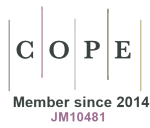Ethics reporting practices in randomized controlled trials of physical therapy interventions after stroke
DOI:
https://doi.org/10.1186/s40945-018-0049-9Keywords:
Ethics reporting, Physical therapy, Randomized controlled trials, StrokeAbstract
Background: Adequate reporting of ethics-related research methods promotes convergence on best ethics practices. In physical therapy, studies on ethics reporting are limited to few aspects, and none focuses on stroke research. Our objectives were to investigate the reporting of multiple ethics-related features and its variation over time, and the characteristics of the studies associated with ethics reporting in Randomized Controlled Trials (RCTs) of physical therapy interventions after stroke. Methods: A random sample of RCTs published in the years 2004, 2009 and 2014, was extracted from the PubMed database, regardless of the publishing journal. For each trial we investigated year of publication, trial registration, sample size, stroke subtype, phase of the disease, setting, interventions and dosing, outcome measures, outcome of the study, PEDro score and 5-year impact factor of the publishing journal. Reporting of ethics-related issues was analyzed. Differences between groups were examined. Multiple regression was used to evaluate the relationship between ethics-related issues reporting and some studies’ characteristics. Results: Eighty studies were reviewed. Groups differed in the proportion of registered trials (p = .009), 5-year impact factor (p = .011), assessment of cognitive capacity (p = .049), declaration about conflict of interest (p < .001), and number of ethics-related issues reported (p = .009). The proportion of issues reported ranged from 92.5% (consent obtaining) to 0% (eventual follow up care). Post-hoc comparisons showed significantly greater reporting of ethics issues in trials published in the year 2014 compared to 2004 (p = .014, 95%CI = 0.40/4.26). Year of publication and PEDro score were significant predictors of adequate reporting. Conclusions: Authors, editors, and reviewers should be more rigorous and demanding about the reporting of ethic-related methods in randomized controlled trials of physical therapy interventions after stroke.Downloads
Download data is not yet available.
Downloads
Published
2018-06-05
How to Cite
Ferrarello, F., Viligiardi, M., & Bari, M. D. (2018). Ethics reporting practices in randomized controlled trials of physical therapy interventions after stroke. Archives of Physiotherapy, 8(1). https://doi.org/10.1186/s40945-018-0049-9
Issue
Section
Research Article
License
Copyright (c) 2018 The Authors

This work is licensed under a Creative Commons Attribution-NonCommercial 4.0 International License.









